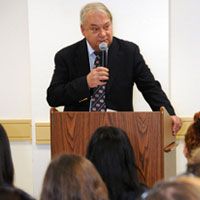
During his childhood in Indiana, Ferid Murad had a habit of memorizing license plate numbers. At the restaurant his parents owned, he would keep customers’ orders in his head and tally their bills without pen or paper. He admits these exercises seem “crazy,” but says they helped him a great deal with the memorization required in medical school.
Murad, M.D., Ph.D., University Professor and professor of Biochemistry and Molecular Biology at the George Washington University School of Medicine and Health Sciences (SMHS), addressed D.C. high school students at a May 18 event co-sponsored by the SMHS Department of Biochemistry and Molecular Biology and the School Without Walls (SWW), a public magnet high school in the Foggy Bottom neighborhood.
Students, teachers, and parents were welcomed to the event by Mary Lord, a District of Columbia Ward 2 Representative; Tony Johnson, Director of the Office of the State Superintendant of Education; and Sydney Bergman, a biology teacher at SWW. They praised GW’s mission of outreach to local youth, which has thrived since the development of a partnership with the District of Columbia Public Schools.
The students in attendance, who hailed from SWW, Bell Multicultural High School, Georgetown Visitation Preparatory School, and St. Albans School, learned about Murad’s path to the Nobel Prize in Physiology or Medicine, which he won in 1998 for his discovery of the biological effects of nitric oxide. The event was conceived of by Rakesh Kumar, Ph.D., professor and Catharine Birch & William McCormick Endowed Chair of the Department of Biochemistry and Molecular Biology, and aimed to recognize the students’ achievements and encourage their study of science and medicine – fields which are experiencing a noted decline in interest among younger generations.
Kumar stressed the role of parents in fostering students’ pursuits. “The responsibility of maintaining an interest in science and medicine is not only yours,” he told the students, “it’s also the parents and teachers and people around you. Parents play a major role in shaping your future.”
Winners of the 2012 District of Columbia Science, Technology, Engineering, and Mathematics (DC STEM) Fair who were in the audience hung on every word of Murad’s advice for budding scientists. “As a scientist, you get to do something for the first time that nobody else has ever done,” he said. “And that’s exciting. Sometimes your discovery opens the door to a whole new way of thinking and even more new discoveries. It’s really cool.”
Murad encouraged the students to consider the five principles he has lived by. They are: establish your goals as soon as possible; work with determination and persistence; be patient; choose a field that you find challenging, yet fun; and use your family, friends, teachers, and mentors as a support network. “At some point, when you’re successful,” Murad said, “it’s important to return something back to society. Leave a big footprint when you’re finished.”
Murad recounted an experience speaking to students in Beijing in 2005. At the end of his talk, which was broadcast on Chinese public television, he had asked the show’s producer what they had accomplished. The producer told him that he’d just been talking to 100 million children all across the country. “Oh boy,” said Murad. “If we could influence just one or two percent of them, China’s going to have an awful lot of scientists.”
Julia Highsmith, a senior at SWW and DC STEM Fair special award winner who attended the event, had the prestigious opportunity to intern at the McCormick Genomic and Proteomic Center in SMHS’ department of Biochemistry and Molecular Biology this year. She spent time interacting with several faculty members, both in the lab and in the classroom, and says it has “given me a lot more insight into biochemistry. Now I know I definitely want to be taking those classes in college,” she said.
To close his remarks, Murad cited competition as a factor in his success. He told of his relationship with a lifelong friend who is now a mechanical engineer for Boeing. The two competed in academics, sports, and chess during childhood, and remained competitive throughout their careers. After the ceremony in Stockholm where Murad accepted his Nobel Prize, his friend leaned over to him and said “Murad – one Nobel to zero.” Murad joked with the students that he believes competition is healthy, “provided you win, of course.”


